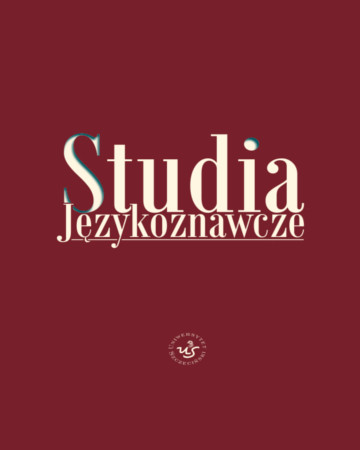Łacińskie i greckie nienormatywne zapożyczenia w polszczyźnie XIX wieku, a ich żywot w polszczyźnie drugiej połowy XX wieku
Latin and Greek non-standard borrowings in the Polish language of the 19th century, and their functioning in the Polish language of the second half of the 20th century
Author(s): Daria KupiduraSubject(s): Lexis, Language acquisition, Historical Linguistics
Published by: Wydawnictwo Naukowe Uniwersytetu Szczecińskiego
Keywords: the historical Polish language; non-standard lexis; borrowings from Latin and Greek;
Summary/Abstract: The objective of the article has been to analyse and interpret the borrowings from Latin and Greek, which at the turn of the 19th and 20th centuries were defined as non-prescriptive (nonstandard),and which were reactivated in the 20th century. Excerpted from Słownik warszawski [Warsaw Dictionary] the vocabulary not accepted by the linguistic norm of the time has been compared to the contents of Słownik języka polskiego [Dictionary of the Polish Language] edited by Mieczysław Szymczak. The research has revealed that 696 words in Słownik warszawski– in its part from letter A to N – were marked with an admonitory exclamation sign, but 136 out of those 696 have been reactivated to the present-day Polish language; the 76 reactivated words are borrowings from Latin and Greek. Most of them are terms from the sphere of medicine, science and technology.According to the analysis the presence of numerous borrowings in the Polish language of that time significantly affected the vocabulary of the language. In some cases it had a negative effect, as it caused excessive variables of the language, in other cases it had a positive effect,because thanks to it the lexical system was extended as the borrowings and the native forms kept diversifying semantically or stylistically. To sum up, the reactivation of many borrowings,rejected in the 19th century, made the Polish lexis become wealthier, and thanks to it there appeared forms which are emotionally different or have a very precise meaning.
Journal: Studia Językoznawcze. Synchroniczne i diachroniczne aspekty badań polszczyzny.
- Issue Year: 2016
- Issue No: 15
- Page Range: 195-210
- Page Count: 16
- Language: Polish

